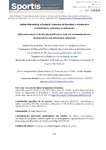Análisis bifactorial de la Escala de Autoestima de Rosenberg y relación entre actividad física y autoestima en adolescentes

Ver/
Use este enlace para citar
http://hdl.handle.net/2183/32101
A non ser que se indique outra cousa, a licenza do ítem descríbese como https://creativecommons.org/licenses/by-nc-sa/4.0
Coleccións
Metadatos
Mostrar o rexistro completo do ítemTítulo
Análisis bifactorial de la Escala de Autoestima de Rosenberg y relación entre actividad física y autoestima en adolescentesTítulo(s) alternativo(s)
Bifactorial analysis of the Rosenberg Self-esteem Scale and relationship between physical activity and self-esteem in adolescentsData
2022-09-01Cita bibliográfica
Chacón-Borrego, F.; Gomis-Gomis, M.J.; Silva-Sousa, C. (2022). Análisis bifactorial de la Escala de Autoestima de Rosenberg y relación entre actividad física y autoestima en adolescentes. Sportis Sci J, 8 (3), 426-441 https://doi.org/10.17979/sportis.2022.8.3.9152
Resumo
[Resumen] La autoestima es un constructo de gran importancia en la adolescencia que favorece la salud y el bienestar psicológico de los escolares. En este trabajo se analiza la bidimensionalidad de la Escala de Autoestima de Rosenberg (EAR) mediante análisis factorial confirmatorio, así como las relaciones existentes entre la práctica de actividad física, Autoestima Global y las dimensión positiva y negativa de la autoestima. Se llevó a cabo en una muestra de 429 estudiantes de Educación Secundaria Obligatoria y Bachillerato de la ciudad de Sevilla (Andalucía). Los instrumentos utilizados fueron Cuestionario de Actividad Física en adolescentes (PaqA de Martínez-Gómez et al., 2009) y Escala de Autoestima de Rosenberg (EAR, 1965) versión de Atienza et al. (2000). Los resultados obtenidos permiten aceptar la bidimensionalidad de la escala, así mismo se constató buenos niveles de autoestima global y una tendencia a una mejor autoestima en los adolescentes activos. La práctica de actividad física se asocia con la dimensión Autoestima Positiva, pero no con la Autoestima Negativa y la Autoestima Global [Abstract] Self-esteem is a construct of great importance in adolescence that favors the health and psychological well-being of schoolchildren. In this paper, the two-dimensionality of the Rosenberg Self-Esteem Scale (RAS) is analyzed through confirmatory factor analysis, as well as the relationships between the practice of physical activity (PA), Global self-esteem, and the positive and negative dimensions of self-esteem. It was carried out in a sample of 429 students in the high school of the city of Seville (Andalusia). The instruments used were the Physical Activity Questionnaire in adolescents (PaqA, Martínez-Gómez et al., 2009) and the Rosenberg Self-Esteem Scale (EAR, 1965) version of Atienza et al. (2000). The results obtained allow us to accept the two-dimensionality of the scale, as well as good levels of global self-esteem and a tendency to better self-esteem in active adolescents. The practice of PA is associated with the Positive Self-esteem dimension, but not with Negative Self-esteem or Global Selfesteem
Palabras chave
Educación física
Deporte
Factores psicológicos
Acoso escolar
Bienestar psicológico
Physical education
Sport
Psychological factors
Bullying
Psychological well-being
Deporte
Factores psicológicos
Acoso escolar
Bienestar psicológico
Physical education
Sport
Psychological factors
Bullying
Psychological well-being
Versión do editor
Dereitos
https://creativecommons.org/licenses/by-nc-sa/4.0
ISSN
2386-8333






